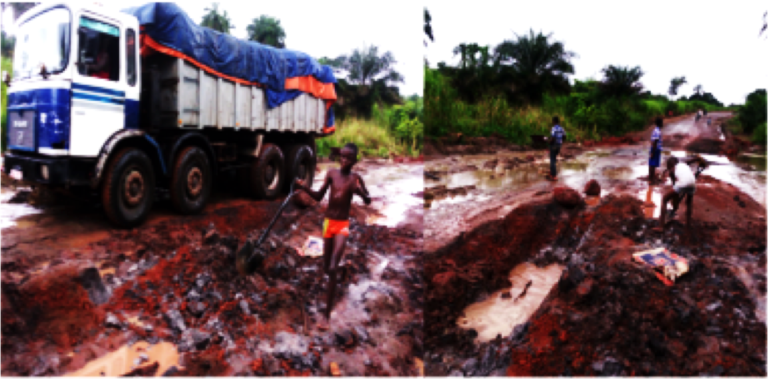By Joseph S. Margai in Freetown, Sierra Leone
The alternative route used by motorist to duck paying toll on the route between Freetown and Makeni has its own problems. The road is bad and it is children in Brama, Makoloh and Konta Line villages in the Western Area Rural and Port Loko Districts are the ones who bearing the blunt of the problem, as they are being subjected to hard labor.
The children are seen on daily basis clearing mud and filling the numerous potholes on the alternative road in order to make vehicles ply the route easily. They told our Freetown Correspondent that they are forced to do so in order to get money to finance their schooling. Schools are expected open soon.
Although motorists are already bypassing the toll road, only 10 of the 62 kilometers toll road project has been reconstructed by the China Railway Seventh Group (CRSG). The entire 62 kilometers stretch costs US$161m.
Already, toll charges have been imposed on motorists and after several advocacies by civil society organizations, an alternative was finally provided to the toll road. But the alternative road is very horrible that vehicles have to struggle through the muddy road in order to avoid paying to pass through all three tollgates.
In a fact-finding mission embarked on by the Groove 106FM in order to know the condition of the alternative road recently, a driver of a heavy duty truck with a registration number AMG 737, Santigie Bangura, said the alternative is very poor that if children do not work on it, they would not be able to pass through it.
“Imagine, if this truck is loaded with cement from Freetown to Makeni, the owner pays me two Le2m ($266.67usd) and I have to pay the owner of the vehicle the sum of Le1m. I have to buy fuel and pay the total sum of Le1, 098, 000 ($146.4usd) to and from the regions using the toll gates, what have I worked,” he asked. He said even though the alternative road is very bad, they have no option but to use it.
He revealed that most times their vehicles are trapped in the mud, but thanks to the children who have become the new saviors of the motorists.
Another driver, Sorie Turay, said government should review the payment of the tollgates and reduce the imposed toll fees, noting that had it not been for children who have hoes and shovels to patch the road, the drivers would have been finding it difficult to ply on it.
“That amount that we are paying to and from the regions using the tollgates is too much. We are not realizing anything as drivers if we use it. The police checkpoint at Mile 38 has been removed, but there are other police interception points along the highway where we spend some amount of money. The burden is too much on us,” he claimed.
The children, who spoke to this reporter on condition of anonymity, said they took the decision to be patching the road because they wanted to generate money to buy some learning and school materials before school reopens.
“Our role on the alternative road is simple; we fill the potholes with stones and clear the mud on the road. The drivers in turn give us token for the services we are rendering,” one of them explained.
However, Abdul Karim Conteh, Head of Child Labor and International Labor Standards Unit in the Ministry of Labor and Social Security, said such activity falls under hazardous jobs for children under the age of 18, noting that it is detrimental to their safety and health.
He said child labor is on the increase in Sierra Leone, especially in the capital, Freetown.
“The hazardous jobs prohibited to children under the age of 18 in Sierra Leone include stone breaking and quarrying, working under harsh weather condition, work involving the use of heavy/dangerous machinery, underground mining, street trading, chemical industries, some work in the agriculture sector, cart pushing and pulling, children should not serve as apprentice for vehicles below 18 years, working at sea, etc.,” Conteh stated.
He said the solutions to child labor are livelihood support program for vulnerable parents and children, affordable education programs for children whose parents are poor, etc., suggesting that these solutions should be firstly sought before enforcement of the laws on child labor.
He revealed that since child labor was brought to the Ministry of Labor in 2010, after it signs an agreement with the International Labor Organization they decided to implement two major conventions, which are 138 Minimum Age for Employment and 182 The Worst Forms of Child Labour. He noted that the Sierra Leonean parliament has ratified both conventions.
“These conventions stressed that children should start to do non-hazardous jobs at age 15 and hazardous jobs at the age of 18,” he stated.

